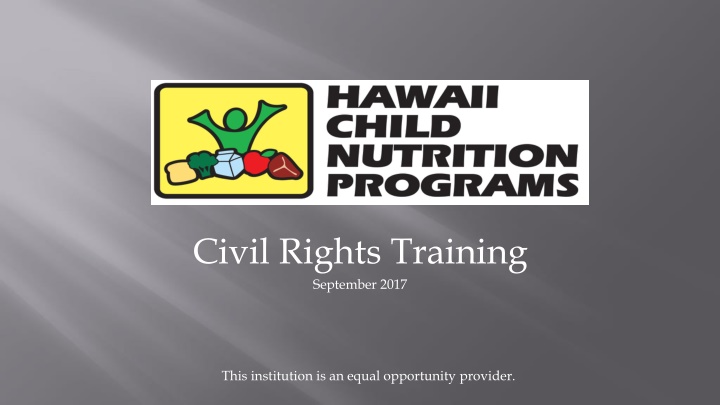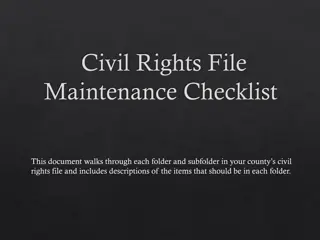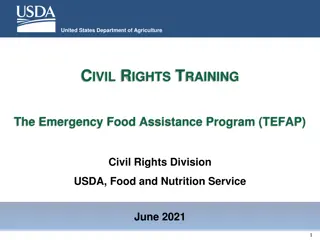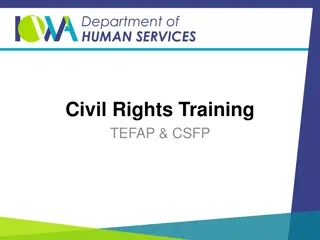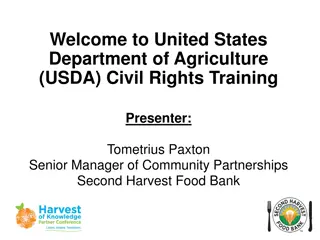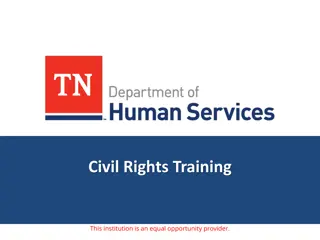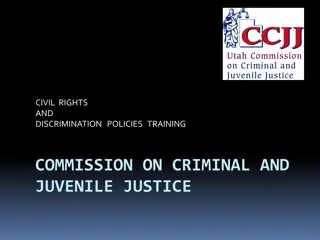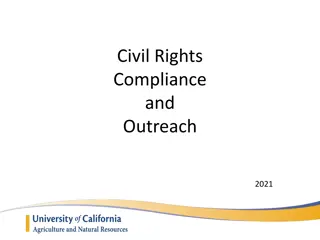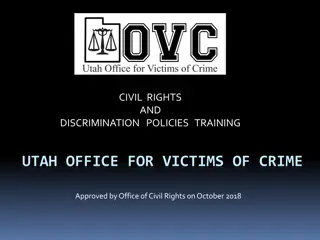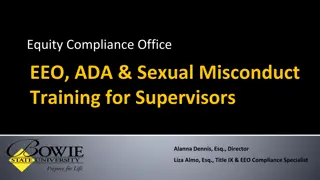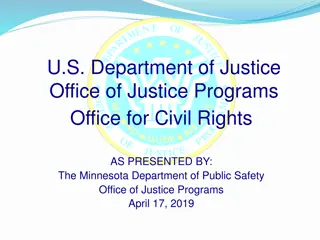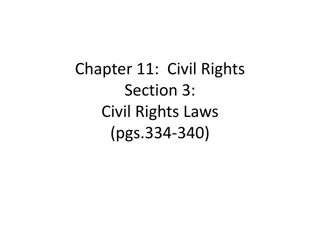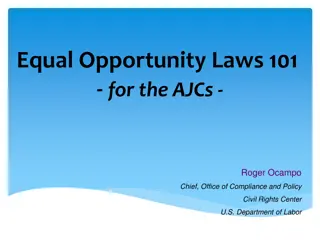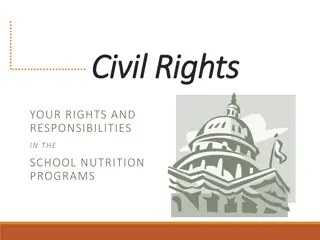Civil Rights Training September 2017 - Ensuring Equal Opportunity and Compliance
This training focuses on civil rights laws and regulations, ensuring equal treatment in programs, accommodating persons with disabilities, and preventing discrimination based on race, color, national origin, age, sex, and disability.
Download Presentation

Please find below an Image/Link to download the presentation.
The content on the website is provided AS IS for your information and personal use only. It may not be sold, licensed, or shared on other websites without obtaining consent from the author.If you encounter any issues during the download, it is possible that the publisher has removed the file from their server.
You are allowed to download the files provided on this website for personal or commercial use, subject to the condition that they are used lawfully. All files are the property of their respective owners.
The content on the website is provided AS IS for your information and personal use only. It may not be sold, licensed, or shared on other websites without obtaining consent from the author.
E N D
Presentation Transcript
Civil Rights Training September 2017 This institution is an equal opportunity provider.
Ensures that program recipients are being treated without discrimination while participating in Child Nutrition Programs
Collection and use of data Effective public notification systems Complaint log and procedures Compliance review techniques Resolution of noncompliance Requirements for accommodation of persons with disabilities Requirements for language assistance Conflict resolution Customer service
Even one dollar of Federal money brings the entire scope of the operations within the jurisdiction of Section 504, even where the requested modification is not related to the part of the operations that receives Federal money.
Title VI of the Civil Rights Acts of 1964 Civil Rights Restoration Acts of 1987 Section 504 of the Rehabilitation Act of 1973 Americans with Disabilities Act (ADA) of 1990 ADA Amendments Act of 2008 Title IX of the Education Amendments of 1972 Age Discrimination Act of 1975 And many more
Race Color National Origin Age Sex Disability
Under Section 504 of the Rehabilitation Act of 1973, and the Americans with Disabilities Act (ADA) of 1990, a "person with a disability" means any person who: has a physical or mental impairment which substantially limits one or more major life activities has a record of such an impairment, or is regarded as having such an impairment
Expanded and clarified the definition of Disability Did NOT change the expectation to provide a reasonable modification DID make very clear that the emphasis must be on providing the reasonable modification and not burdening the disabled person with proving he or she has a disability.
Revises Substantially Limits Need not prevent or severely prevent a major life activity Individualized Assessment Without regard to alleviated symptoms by medications. May include an impairment that is episodic or in remission if it would substantially limit a major life activity when active.
In addition to Major Life Activities: Seeing, hearing, walking, speaking, learning, reading, eating, breathing Major Bodily Activities: Digestive*, Immune System, Respiratory, Circulatory, Neurological/Brain
Denialof benefits or services that others receive Delayin receiving benefits or services that others receive Different treatment than others, leading to disadvantage Ineffective communication Failure to provide reasonable accommodation Inaccessible Facilities Failing to provide non-English materials *SFAs must understand & accept that providing modifications is the new normal*
Medical Statement Form Awaiting USDA Updating What food to be avoided? Brief explanation of how exposure to food affects the participant Recommended substitute(s) Medical authority signature
Medical Statement Requirements Statement provides sufficient information about impairment (diagnosis not required and should not be requested), how it restricts diet, and how to accommodate condition Seek clarification if inadequate or unclear Clarification should not unnecessarily delay modification it could be characterized as harassment/denial
Medical Statement Requirements May accept statements signed by: Physician (MD) Physician Assistant (PA) Nurse Practitioner (APRN/RPN) Osteopathic Physician (DO) Naturopathic Physician (ND) Medical Statement may be requested, but it is NOT required for substitutions within meal pattern requirements.
To verify if a person is licensed by the State of Hawaii to write prescriptions, verification can be determined on the DCCA website: http://pvl.ehawaii.gov/pvlsearch/app
A change or alteration in policies, practices, and/or procedures to accommodate a disability Duty to negotiate over modification. This means simply saying no is almost never appropriate. On a case-by-case basis Providing appropriate modifications is the primary objective, not ferreting out whether the participant has a disability or abusing the process
Handicap accessibility Food allergies Accommodations/Modifications addressed in 504, Individual Education Plan (IEP), Call State agency at 808-587-3600 for further guidance
Should be related to the disability or limitations caused by the disability Does not have to be the modification requested Meal accommodations do not need to mirror the meal or meal item substituted. Should be implemented even where the person requesting modification believes more should be done Must be free of charge
Consider costs/resources, and the participant s age and ability Lifestyle choices (e.g. vegetarian) and religion are not considered disabilities and need not be accommodated.
Ensure food service areas are accessible Provide auxiliary aides and services, if needed. Adaptive feeding equipment Meal tracking assistance Other effective methods
Many food allergies fall under the definition of disability expanded by the ADA Amendments Act (ADAAA). According to the CDC: In the United States, the following eight foods or food groups account for 90% of serious allergic reactions: milk, eggs, fish, crustacean shellfish, wheat, soy, peanuts, and tree nuts. Applies to much more than just life threatening allergic reactions. Digestive and Respiratory functions are specifically listed in the ADAAA.
Universal exclusions of specific foods or food groups is not an FNS policy, but could be appropriate depending on the circumstances, and is within the discretion of recipients
Integration Clause: disabled individuals should be accommodated in the least restrictive and most integrated setting possible. Balance safety vs. stigma. Age and severity are the primary considerations.
Develop procedures for parents/guardians to request reasonable modifications Train staff on reasonable modification procedures and legal requirements Appoint a 504 Coordinator to ensure compliance Implement guidelines and render decisions on modification requests.
The Procedural Safeguards process requires SFAs/LEAs to provide notice and information to parents and guardians regarding how to request a reasonable modification and their procedural rights, which include the right to: File a grievance Receive a prompt response An impartial hearing Be represented by counsel, if desired Receive notice of the final decision
USDA SP 40-2017: Accommodating Children with Disabilities in the School Meal Programs SP 59-2016: Policy Memorandum on Modifications to Accommodate Disabilities in the School Meal Programs https://www.fns.usda.gov/2017-edition-accommodating- children-disabilities-school-meal-programs https://edu.wyoming.gov/downloads/nutrition/2016/sp59- 2016.pdf
Collection and Use of Data Required to obtain data by ethnic and racial category Systems for collecting actual ethnic and racial data may be program specific Annual reporting on the ethnic and racial data
Not Hispanic or Latino Hispanic or Latino A person of Cuban, Mexican, Puerto Rican, South or Central American, or other Spanish culture or origin - regardless of race
Black or African American Aperson having origins in any of the black racial groups of Africa White - A person having origins in any of the original peoples of Europe, the Middle East, or North America Asian - A person having origins in any of the peoples of the Far East, Southeast Asia, or the Indian subcontinent, including: Cambodia, China, India, Japan, Korea, Malaysia, Pakistan, the Philippine Islands, Thailand, and Vietnam
Native Hawaiian or Other Pacific Islander - A person having origins in any of the original peoples of Hawaii, Guam, Samoa, or other Pacific Islands American Indian or Alaskan Native - A person having origins in any of the original peoples of North America (including Central America) who maintains tribal affiliation or community attachment
Program availability Inform potentially eligible persons of their program rights Complaint information Applicants and participants must be advised of their right to file a complaint Non-discrimination poster statement Prominently display current And Justice For All poster
Inform potentially eligible applicants about the program Provide information in alternative formats for those with disabilities Include non-discrimination statement on all material provided to public Convey an equal opportunity message in all pictures
In accordance with Federal civil rights law and U.S. Department of Agriculture (USDA) civil rights regulations and policies, the USDA, its Agencies, offices, and employees, and institutions participating in or administering USDA programs are prohibited from discriminating based on race, color, national origin, sex, disability, age, or reprisal or retaliation for prior civil rights activity in any program or activity conducted or funded by USDA. Persons with disabilities who require alternative means of communication for program information (e.g. Braille, large print, audiotape, American Sign Language, etc.), should contact the Agency (State or local) where they applied for benefits. Individuals who are deaf, hard of hearing or have speech disabilities may contact USDA through the Federal Relay Service at (800) 877-8339. Additionally, program information may be made available in languages other than English. To file a program complaint of discrimination, complete the USDA Program Discrimination Complaint Form, (AD-3027) found online at: http://www.ascr.usda.gov/complaint_filing_cust.html, and at any USDA office, or write a letter addressed to USDA and provide in the letter all of the information requested in the form. To request a copy of the complaint form, call (866) 632-9992. Submit your completed form or letter to USDA by: (1) mail: U.S. Department of Agriculture Office of the Assistant Secretary for Civil Rights 1400 Independence Avenue, SW Washington, D.C. 20250-9410; (2) fax: (202) 690-7442; or (3) email: program.intake@usda.gov USDA Child Nutrition Programs recognize the following protected classes: race, color, national origin, sex, age, and disability. This institution is an equal opportunity provider.
This institution is an equal opportunity provider. Use other languages as required. Pens, buttons, etc. are exempted due to size. When in doubt, always include the Statement.
Application Form (s) Notification of Eligibility or Ineligibility Notice of Adverse Action Form Program (Home) Web Page Public Information, including program literature e.g. outreach
Right to File Any person alleging discrimination based on a protected class has the right to file a complaint within 180 days of the discriminatory action Acceptance All complaints must be forwarded to the State Agency within FIVE DAYS. Verbal If a person makes a verbal complaint , the person to whom the allegations are made must write up the complaint, making an attempt to collect specific information
Sponsors must keep a Civil Rights Binder or File with the required civil rights complaint documents: Written civil rights complaint procedure Annually dated civil rights complaint log Copies of civil rights complaint forms
Information in the civil rights binder/file must be annually updated and maintained for three years plus the current year
Reviews Reviews USDA Local Agencies (SFAs) State Agency Regional Office Reports
Enrollment forms Menus Informational brochures Letters to families and notifications Free Translations see http://www.freetranslation. com Hawaii Bilingual Access Line: (808) 526-9724 Esta instituci n es un proveedor que ofrece igualdad de oportunidades.
All complaints alleging discrimination on the basis of race, age, color, national origin, sex, or disability, must be: forwarded to the State agency within five days processed by USDA within 90 days
Annual Civil Rights training for all staff & volunteers DOCUMENT TRAINING Maintain Civil Rights Complaint Log(s) Non-discrimination statement on all printed materials mentioning Child Nutrition Programs Display current And Justice For All poster Collect and record race and ethnic data annually Keep all records for three years plus the current year Offer meals to all
Professional Standards http://professionalstandards.nal.usda.gov/ Key Area: Administration 3000 Key Topic: Policies and Procedures 3420
Non-discrimination Statement In accordance with Federal civil rights law and U.S. Department of Agriculture (USDA) civil rights regulations and policies, the USDA, its Agencies, offices, and employees, and institutions participating in or administering USDA programs are prohibited from discriminating based on race, color, national origin, sex, religious creed, disability, age, political beliefs, or reprisal or retaliation for prior civil rights activity in any program or activity conducted or funded by USDA. Persons with disabilities who require alternative means of communication for program information (e.g. Braille, large print, audiotape, American Sign Language, etc.), should contact the Agency (State or local) where they applied for benefits. Individuals who are deaf, hard of hearing or have speech disabilities may contact USDA through the Federal Relay Service at (800) 877-8339. Additionally, program information may be made available in languages other than English. To file a program complaint of discrimination, complete the USDA Program Discrimination Complaint Form, (AD-3027) found online at: http://www.ascr.usda.gov/complaint_filing_cust.html, and at any USDA office, or write a letter addressed to USDA and provide in the letter all of the information requested in the form. To request a copy of the complaint form, call (866) 632-9992. Submit your completed form or letter to USDA by: (1) mail: U.S. Department of Agriculture Office of the Assistant Secretary for Civil Rights 1400 Independence Avenue, SW Washington, D.C. 20250-9410; (2) fax: (202) 690-7442; or (3) email: program.intake@usda.gov USDA Child Nutrition Programs recognize the following protected classes: race, color, national origin, sex, age, and disability. This institution is an equal opportunity provider.
Hawaii Child Nutrition Programs Phone : 808-587-3600 http://hcnp.hawaii.gov
